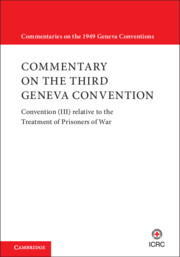 Commentary on the Third Geneva Convention
Commentary on the Third Geneva Convention Book contents
- Commentary on the Third Geneva Convention
- International Committee of the Red Cross
- Copyright page
- Contents
- Foreword by Peter Maurer
- Acknowledgements
- Abbreviations
- Introduction
- Preamble
- Part I General Provisions
- Part II General Protection of Prisoners of War
- Part III Captivity
- Part IV Termination of Captivity
- Part V Information Bureaux and Relief Societies for Prisoners of War
- Part VI Execution of the Convention
- Section I General provisions
- Article 126 Supervision by the Protecting Powers and the ICRC
- Article 127 Dissemination of the Convention
- Article 128 Translations. Implementing Laws and Regulations
- Article 129 Penal Sanctions
- Article 130 Grave Breaches
- Article 131 Responsibilities of the Contracting Parties
- Article 132 Enquiry Procedure
- Section II Final provisions
- Book part
- Sources
- Index
- References
Article 132 - Enquiry Procedure
from Section I - General provisions
Published online by Cambridge University Press: 21 August 2021
- Commentary on the Third Geneva Convention
- International Committee of the Red Cross
- Copyright page
- Contents
- Foreword by Peter Maurer
- Acknowledgements
- Abbreviations
- Introduction
- Preamble
- Part I General Provisions
- Part II General Protection of Prisoners of War
- Part III Captivity
- Part IV Termination of Captivity
- Part V Information Bureaux and Relief Societies for Prisoners of War
- Part VI Execution of the Convention
- Section I General provisions
- Article 126 Supervision by the Protecting Powers and the ICRC
- Article 127 Dissemination of the Convention
- Article 128 Translations. Implementing Laws and Regulations
- Article 129 Penal Sanctions
- Article 130 Grave Breaches
- Article 131 Responsibilities of the Contracting Parties
- Article 132 Enquiry Procedure
- Section II Final provisions
- Book part
- Sources
- Index
- References
Summary
Article 132 is part of the system elaborated by the four Geneva Conventionsof 1949, and subsequently by Additional Protocol I, to ensure that Partiesto international armed conflicts comply with their obligations under theseinstruments. The article is common to the four Conventions. It appears underthe heading ‘Repression of abuses and infractions’ in the First and SecondConventions, and ‘Execution of the Convention’ in the Third and FourthConventions.
- Type
- Chapter
- Information
- Commentary on the Third Geneva ConventionConvention (III) relative to the Treatment of Prisoners of War, pp. 1925Publisher: Cambridge University PressPrint publication year: 2021
